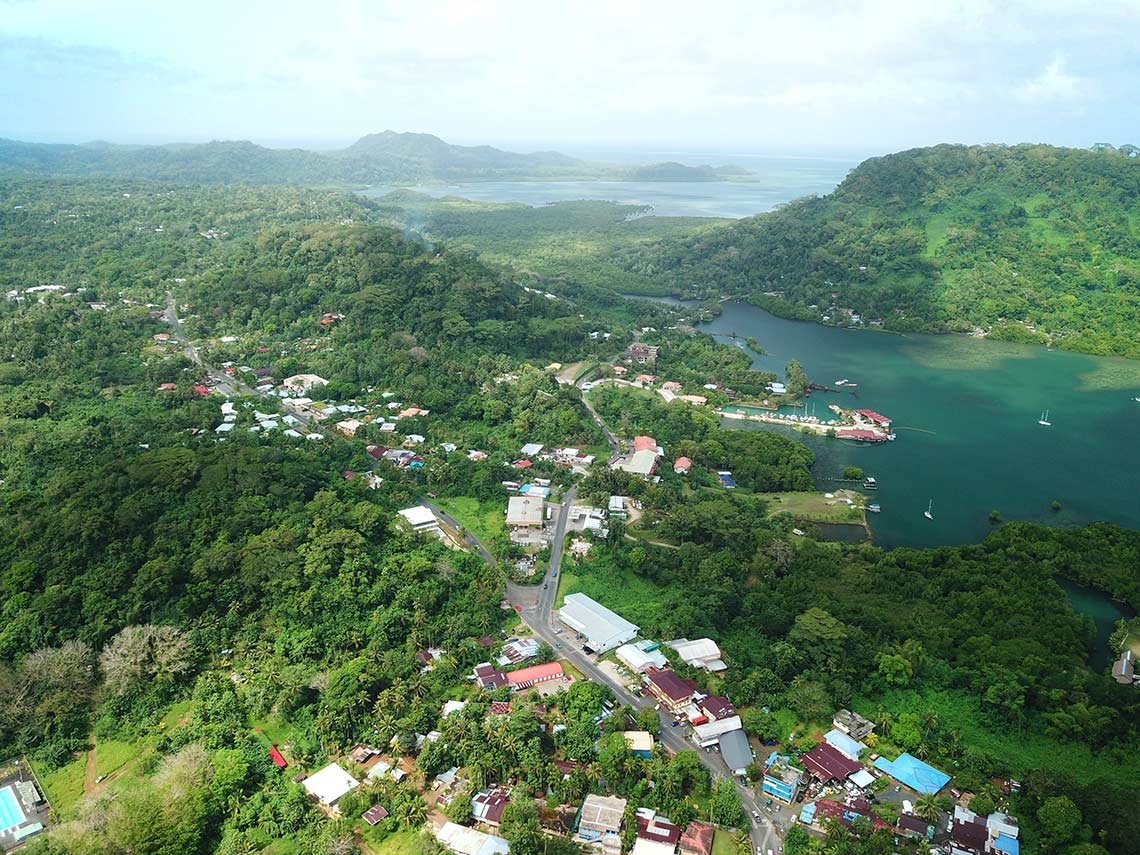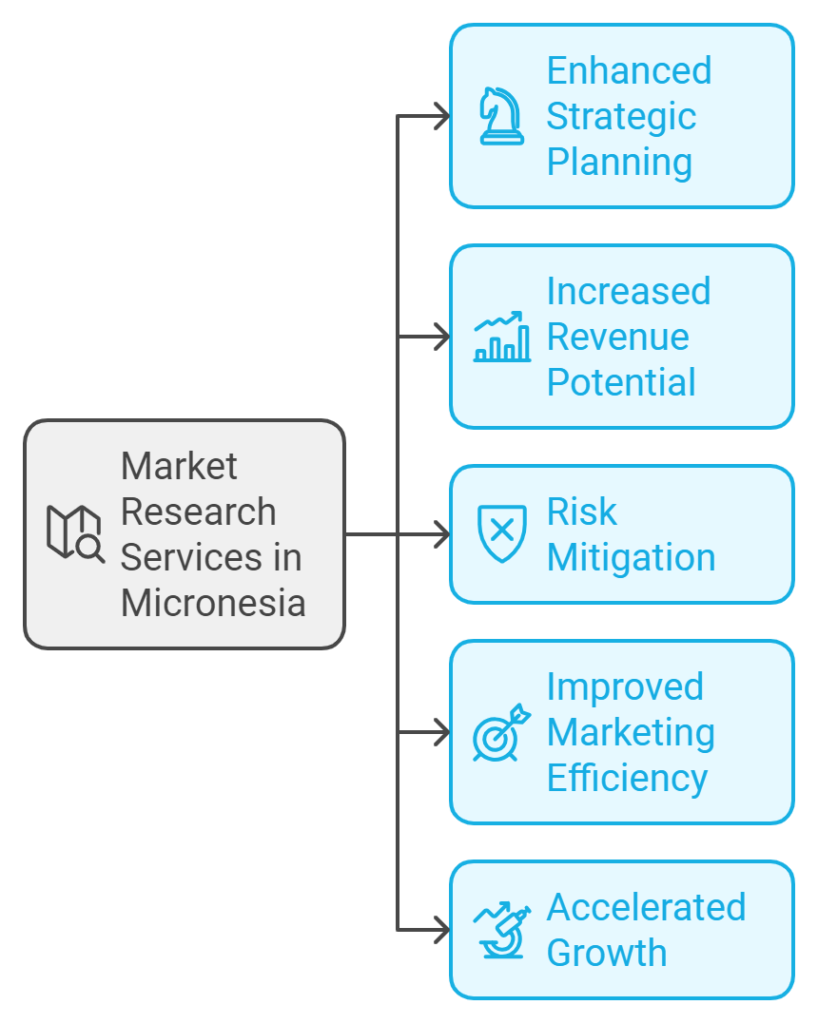Market Research in Micronesia

Entering the Micronesian market requires a deep understanding of the local culture and consumer behavior.
Are you considering expanding your business to Micronesia but unsure where to start? Market research in Micronesia is the foundation for making informed decisions and understanding the local business environment. Conducting market research can help identify challenges, assess consumer preferences, and reveal new growth opportunities.
What Is Market Research in Micronesia?
Market research in Micronesia helps businesses make informed decisions about the Micronesian market. The market presents unique challenges, including cultural diversity, geographical separation, and varying consumer behaviors across different islands. These challenges make it essential for companies to understand the needs, preferences, and purchasing patterns of local consumers.
Through market research in Micronesia, businesses can identify key trends, evaluate market potential, and recognize the specific needs of the population. This research helps address questions such as: What products and services are most in demand? How do cultural differences impact consumer behavior? By gaining insights into these issues, companies can tailor their marketing strategies to effectively reach and engage the Micronesian audience.
Why Do Businesses Need Market Research in Micronesia?
By leveraging market research in Micronesia, companies can ensure their strategies align with local market needs and develop solutions that address specific regional challenges. This approach not only helps mitigate risks but also enhances the potential for long-term success and growth.
Market research in Micronesia also helps businesses make informed decisions about the Micronesian market. The market presents unique challenges, including cultural diversity, geographical separation, and varying consumer behaviors across different islands. These challenges make it essential for companies to understand the needs, preferences, and purchasing patterns of local consumers.
Moreover, through market research in Micronesia, businesses can identify key trends, evaluate market potential, and recognize the specific needs of the population. This research helps address questions such as: What products and services are most in demand? How do cultural differences impact consumer behavior? By gaining insights into these issues, companies can tailor their marketing strategies to effectively reach and engage the Micronesian audience.
Neighborhoods
The Federated States of Micronesia, also known as the FSM, consists of over 600 islands in Oceania in the Pacific Ocean. It is an English-speaking country with deep ties with the United States. The country has four groups of island states: Kosrae, Pohnpei, Yap, and Chuuk. It is famous for its ancient ruins, wreck-filled dives, and palm-shaded beaches.
Pohnpei is home to the nation’s capital, Palikir. It is a great tourist stop, with sandy beaches and tropical jungles attracting tourists. Another great thing about Pohnpei is that it is superb for hiking.
Key Industries
The tourism industry stands out as one of the most promising sectors, attracting visitors with Micronesia’s natural beauty, including stunning beaches and vibrant marine life. Companies like Pacific Islands Tourism and local hospitality businesses play a pivotal role in shaping the tourism landscape, offering unique travel experiences that attract international tourists.
Another important industry is agriculture, with a focus on local crop production such as coconuts, taro, and bananas. Market research in Micronesia reveals that agricultural businesses are gradually adopting more sustainable practices, which opens up opportunities for companies specializing in agricultural technology and services. Additionally, the renewable energy sector is gaining traction, driven by initiatives to reduce reliance on imported fossil fuels. Companies like Micronesia Renewable Energy are leading efforts to provide clean energy solutions that benefit both businesses and local communities.
Identifying these key industries through market research in Micronesia allows businesses to align their strategies with sectors that are central to the region’s economic development. Whether it’s tourism, agriculture, or renewable energy, understanding the dynamics of these industries is crucial for success in Micronesia.
Trends
The FSM’s fishing industry is vital, and several foreign fleets operate here. It costs them millions of dollars each year to do so, and these license fees make up almost one-third of the country’s revenue. Marine exports, including the reexporting of fish to Japan, provide a large amount of its export revenue.
The islands have a tourist industry, but infrastructure has hampered it. Visitor spots include:
- Battle sites from the Second World War
- Scuba diving in each state
- The ruins of Nan Madol, an ancient city in Pohnpei
Tourism is one of the industries with high growth potential.
On the other hand, farming is declining. Most of the farmers subsist on their produce. Bananas, coconuts, sweet potatoes, and cassava are the main crops. Very little export revenue comes from farming. In fact, only about one-tenth of the islands’ people work in the sector.
There’s also very little manufacturing. Most of it involves the export of betel nuts in Yap and the button-making using the trochus shell.
Opportunities in Micronesia
Micronesia presents numerous opportunities across various sectors that businesses can explore for growth. By leveraging market research in Micronesia, companies can uncover these opportunities and strategically position themselves for success.
- Tourism: The tourism industry offers significant potential, especially for companies specializing in adventure tourism, eco-tourism, and cultural experiences. As Micronesia continues to draw international visitors, there is a growing demand for innovative travel services that showcase the region’s culture and natural beauty.
- Agriculture: Opportunities exist for businesses to introduce sustainable agricultural practices and technology solutions. With a focus on enhancing productivity and adopting eco-friendly methods, companies providing agricultural technology, training, and supply chain solutions can expand their operations in Micronesia.
- Renewable Energy: The renewable energy sector is promising, driven by efforts to reduce dependence on imported fossil fuels. Businesses specializing in solar, wind, or other clean energy solutions can benefit from government incentives and a supportive policy environment, while also making a positive impact on local communities.
- Fishing Industry: Micronesia’s fishing industry presents an opportunity for growth, particularly in seafood exports. Companies that focus on sustainable fishing practices and value-added processing can capitalize on the high demand for seafood in international markets.
- Infrastructure Development: As the region works to improve connectivity, there are opportunities for businesses involved in construction, logistics, and infrastructure projects. Investments in better roads, ports, and telecommunications can help enhance economic activity across Micronesia.
- Healthcare Services: There is a growing need for improved healthcare facilities and services in Micronesia. Companies offering medical equipment, telehealth solutions, and healthcare management services can find opportunities to support the region’s healthcare infrastructure.
- Education and Training: With a focus on skills development, businesses specializing in education and vocational training can help meet the local demand for skill-building initiatives. Opportunities exist for companies providing training in sectors such as hospitality, technology, and renewable energy.
Benefits and Strengths of the Market
The FSM is doing well, and the market is easy to enter. Thus, companies can be more creative. It also allows them to provide a wider variety of goods for their consumers.
Consumer base
The citizens of the FSM tend to spend their money on the following:
- Household goods
- Food
- Healthcare
- Education
- Entertainment
- Transportation
Reasons to Grow a Business in Micronesia
The FSM presents many opportunities for investors and business partners. For example, it is a superb location with a close link with the US. These islands also have an under-developed natural resource sector. But, they have the infrastructure needed for business:
- The FSM Telecom Corp provides Internet, fax, phone, cellphone, and cable services.
- There are deepwater port facilities and international airports in each of the four states. The ports can at least handle colossal container ships, including warehousing and transshipment.
- The FSM Development Bank offers investment services. The country also has commercial banks, such as the Bank of the FSM and the Bank of Guam.
- Businesses can find diesel generators in all the major centers. These generators provide 110-220 volt, 60-cycle electric power.
- Accounting and legal services are available and easy to access throughout the country.
Foreign companies in some sectors can receive partial government funding for employee training. The FSM has other advantages. For example, exports receive duty-free treatment in US markets, and the country also has preferential market status in Australia and New Zealand. The FSM uses the US dollar as its national currency, and English is the official language of business.
How SIS International’s Market Research in Micronesia Helps Businesses
Market research is crucial for any company looking to enter or expand in Micronesia. At SIS, we specialize in providing comprehensive market research services that help businesses gain the insights they need to succeed. By conducting market research in Micronesia, we empower businesses to make informed decisions that align with the unique dynamics of the region.

- Enhanced Strategic Planning: Our market research provides detailed data on consumer preferences, cultural factors, and emerging trends, enabling businesses to refine their strategic plans to better meet the needs of Micronesian customers.
- Increased Revenue Potential: By understanding local consumer behaviors and identifying high-demand products and services, we help companies tap into revenue opportunities and create offerings that resonate with their target audience.
- Risk Mitigation: Our market research services highlight potential risks and challenges specific to the Micronesian market, allowing businesses to prepare effective mitigation strategies and avoid costly missteps.
- Improved Marketing Efficiency: By leveraging insights from market research in Micronesia, businesses can focus their marketing efforts on the channels and messages that resonate most with local consumers, maximizing return on investment.
- Accelerated Growth: Understanding market trends and consumer needs allows companies to innovate effectively, leading to accelerated growth and long-term success in Micronesia.
About SIS International
SIS International offers Quantitative, Qualitative, and Strategy Research. We provide data, tools, strategies, reports, and insights for decision-making. We also conduct interviews, surveys, focus groups, and other Market Research methods and approaches. Contact us for your next Market Research project.


